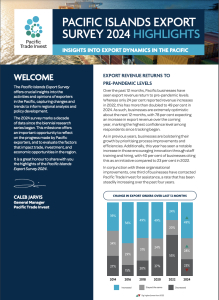Earlier this year, Pacific Trade Invest (PTI) Australia invited exporters across the Pacific to participate in the Pacific Islands Export Survey 2024. The survey, conducted biennially, provides crucial insights into the activities, challenges, and opportunities faced by Pacific exporters, informing regional policy development and trade strategies. PTI Australia is a key agency dedicated to promoting trade and investment in the Pacific Islands, supporting economic development, and enhancing the international competitiveness of Pacific businesses.
The Pacific Islands Export Survey 2024 highlights the significant strides made by Pacific exporters in recovering from the economic impacts of the COVID-19 pandemic. Export revenue has surged back to pre-pandemic levels, with 49 per cent of businesses reporting increased revenue in 2024, compared to just 24 per cent in 2022. This resurgence in export activity has fostered a high level of optimism, with 78 per cent of respondents expecting further revenue increases over the next 12 months. This marks the highest confidence level since the survey began a decade ago.
Innovation and Support
To sustain growth, Pacific businesses are focusing on process improvements and efficiencies. This year, 40 per cent of businesses reported initiatives aimed at encouraging innovation through staff training and hiring, a significant increase from 23 per cent in 2022. Additionally, one-third of businesses have sought assistance from Pacific Trade Invest, a trend that has been steadily rising over the past four years. The survey underscores the importance of support and collaboration in enhancing the capabilities of Pacific exporters.
Digital Transformation and Market Dynamics
Digital marketing has emerged as a crucial strategy for Pacific exporters, with 76 per cent generating revenue through online channels. The proportion of businesses reporting increased online revenue has risen to 42 per cent, up from 24 per cent in 2022, driven primarily by easier access to digital devices. Despite this progress, the full potential of digital tools remains untapped, and there is a strong appetite for further training to maximize online revenue opportunities.
Internationally, Australia and New Zealand remain key export destinations, with exports to North America and Europe also returning to pre-pandemic levels. However, the enthusiasm for expanding into new markets has slightly diminished, with 71 per cent of businesses planning market expansions within the next three years, compared to 86 per cent in 2016. This decline may be attributed to persistent export barriers, such as logistics costs and access to finance.
Climate Impact and Barriers
The survey highlights the significant challenges posed by climate change and extreme weather events, with 72 per cent of businesses affected in the past year. The impacts of severe weather have increased, disrupting operations and causing damage to products and property. The agriculture and tourism sectors are particularly vulnerable, with weather events leading to business closures and increased insurance premiums.
Access to finance remains a critical barrier, with 65 per cent of exporters finding it difficult to obtain funding, the highest level since the survey began. The agriculture sector is most affected, with 76 per cent of respondents citing finance as a significant barrier. Limited financial track records and a lack of bank flexibility are major contributing factors.
Logistics and labour issues also continue to impede export activities. While these challenges have returned to pre-pandemic levels, they still represent significant obstacles, particularly for the agriculture and manufacturing sectors. The need for shipping route support has increased, with a notable rise in demand for assistance with inter-Pacific trade routes.
The insights from this survey will be instrumental in shaping policies and strategies to support the continued development of the Pacific’s export sector.
Click here to download the survey.




